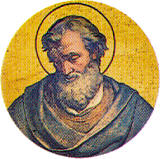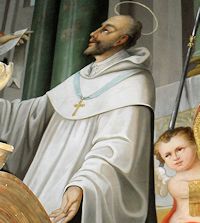Whoever comes to me will never hunger. (John 6:35)
What kept so many people who saw Jesus from believing in him? Was it their limited expectations? They seemed ready enough to accept that he could multiply bread. But could he really give anyone who believed in him “eternal life” and “raise him up on the last day” (John 6:40)? Maybe that was too much. Maybe their idea of Jesus—and of God—was too small to allow for anything so mind-boggling.
How easy it can be to box God into some narrow category that limits or distorts him! Some see him as a harsh schoolteacher, always examining our performance for flaws and grading it severely. Some of us, thinking back to childhood warnings that “God sees everything,” imagine a big, cold, unblinking, unmerciful eye in the sky. For others, calling God “Father” evokes the image of an overbearing, intolerant authority figure.
How much bigger and better than our deficient thoughts God really is! He is a Father of endless mercy who not only intends but desires to welcome as many sons and daughters as possible to his banquet. Far from wanting to condemn you, he wants to make you become like him and bring you to live with him forever. If the vastness of this plan makes you want to retreat into “safe” little ideas you can handle, don’t give in! Don’t settle for anything less than partaking in God’s divine nature. Sure, it’s more than you or anyone else can comprehend, but this really is the awesome destiny God desires for you.
Keep this in mind today, and see the difference it makes. God loves you so much that he offers you a share in the very mind and heart of the Father, Son, and Holy Spirit. You are called to be a coheir with Christ, a sharer in God’s glory. With the Holy Spirit in you, your prayers can change the world—securing blessings for leaders, disrupting evil plots, reducing suffering, bringing healing. You never have to walk with your head hanging down if you believe in Christ! Every “small” idea can fall by the wayside, and you can move ahead with confidence in God and his loving plan.
“Father, thank you for calling me to be with you for eternity and to know you even now! Increase my confidence in you, and help me to see you as you really are.”
Acts 8:1-8; Psalm 66:1-7

 Stephen Harding, son of an English noble, was born at Sherborne in Dorsetshire, England, about the middle of the eleventh century. He consecrated himself to the monastic life in the Abbey of Sherbonne in Dorsetshire, where he received his early education. He later studied in Paris and Rome, where he pursued a brilliant course in humanities, philosophy and theology.
Stephen Harding, son of an English noble, was born at Sherborne in Dorsetshire, England, about the middle of the eleventh century. He consecrated himself to the monastic life in the Abbey of Sherbonne in Dorsetshire, where he received his early education. He later studied in Paris and Rome, where he pursued a brilliant course in humanities, philosophy and theology.